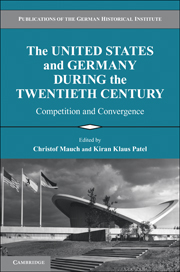Book contents
- Frontmatter
- Contents
- Contributors
- Acknowledgments
- 1 Modernities: Competition versus Convergence
- 2 Empires: Might and Myopia
- 3 Religion: Belief and Power
- 4 Law: Constitutionalism and Culture
- 5 Welfare: Entitlement and Exclusion
- 6 Immigration: Myth versus Struggles
- 7 Masses: Mobilization versus Manipulation
- 8 Market: Consumption and Commerce
- 9 Authority: Schools and Military
- 10 Gender: Equality and Differences
- 11 Environment: Conservation versus Exploitation
- 12 Film and Television
- 13 Education: Universities and Research
- 14 Media: Government versus Market
- Index
8 - Market: Consumption and Commerce
Published online by Cambridge University Press: 12 October 2018
- Frontmatter
- Contents
- Contributors
- Acknowledgments
- 1 Modernities: Competition versus Convergence
- 2 Empires: Might and Myopia
- 3 Religion: Belief and Power
- 4 Law: Constitutionalism and Culture
- 5 Welfare: Entitlement and Exclusion
- 6 Immigration: Myth versus Struggles
- 7 Masses: Mobilization versus Manipulation
- 8 Market: Consumption and Commerce
- 9 Authority: Schools and Military
- 10 Gender: Equality and Differences
- 11 Environment: Conservation versus Exploitation
- 12 Film and Television
- 13 Education: Universities and Research
- 14 Media: Government versus Market
- Index
Summary
American GIs hand out chewing gum, chocolate bars, and cigarettes in occupied Germany; West German youngsters in the 1960s and 1970s are fascinated by the images of American pop and protest culture;Coca-Cola and McDonald's dominate everyday life inWestern Europe. As these developments attest and countless other ubiquitous images underscore, aside from its influence on world power struggles, there is hardly a sphere that modern America and its global influence throughout the twentieth century have affected as deeply and as penetratingly as the world of mass consumption. We seem to have a clear winner in the contest to shape the modern era: the United States emerges as the pioneer of the market-driven society, especially with respect to consumerism. It is a phenomenon that, in addition to its economic impact, fundamentally changes or even invents in many ways the culture of everyday life, the concept of lifestyles, and the world of images and symbols that characterizes the modern era. Bundled into the term “Americanization” is the notion of a one-way street, running from West to East, from which the Germans constantly received new impulses of modernism emanating fromthe United States, without ever being able to counter them with their own.
On closer inspection, however, this picture becomes more complex. In fact, we can easily call up images of a successful transfer of consumer goods from Germany to America; German luxury cars parked in front of American garages, for example, and German kitchens sparkling in American households. Products “made in Germany” have long had the reputation in the United States of being not only at the cutting edge of technology but also embodying the latest stylistic innovations. Thus, we see that the cultural dimension of consumerism in these two countries is also reciprocal. Viewed historically, the conventional images of German–American commercial consumption are clearly concentrated in the period since World War II when the political ties between the Federal Republic and the United States were at their strongest. However, the question arises as to whether the lead that America enjoyed since the late nineteenth century in establishing the modern, commercialized, and urbanized society was so obviously dominant or whether this competition with Germany toward a consumer society was more evenly matched.
- Type
- Chapter
- Information
- The United States and Germany during the Twentieth Centurycompetition and convergence, pp. 121 - 143Publisher: Cambridge University PressPrint publication year: 2010
- 1
- Cited by

